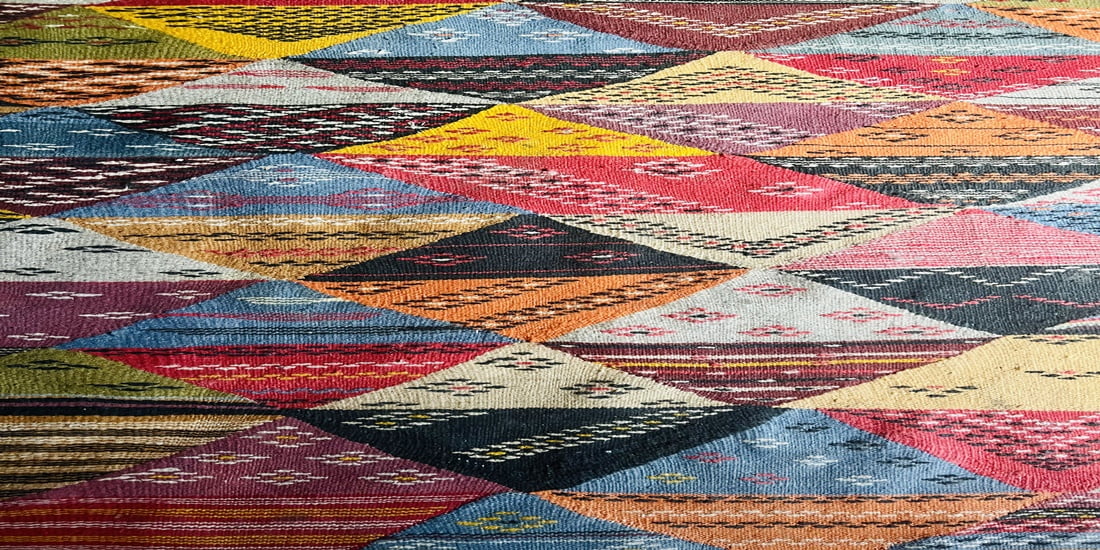
Berber Amazigh carpets in Morocco
Discovering Berber Carpets in Morocco: Threads of Tradition
Traditional industries in the kingdom of Morocco contribute significantly to the country’s overall development, playing essential roles in its economic, social, and cultural progress. These industries also support national identity and artistic creativity.
In Morocco, Berber carpets are prized for their vibrant colors, intricate designs, and rich cultural heritage. They serve as both functional decor and valuable expressions of Berber Amazigh tradition.
Since the settling of the Amazigh tribes in Morocco, women have been engaged in weaving colorful and diverse rugs/carpets over time. These beautiful creations, crafted by passionate and creative women, contribute to Morocco’s rich and varied cultural heritage.
Whether captivated by the beauty of Berber carpets, the precision of Amazigh carpet weaving, or the vibrant colors of the Atlas Mountains carpets, many are enamored with the traditional Moroccan rugs on an international level.
In Morocco, it’s rare to find a home, room, mosque, or public space without beautiful carpets. These decorative pieces, considered essential elements of daily life, hold a special place in Moroccan homes. However, traditional craftsmanship faces competition from foreign products such as Turkish, Chinese, Persian, or Syrian carpets, sold at competitive prices with satisfactory quality.
With the appearance of Turkish, Chinese, Persian, or Syrian carpets in the Moroccan market, available at competitive prices and satisfactory quality, Moroccan consumers have been drawn to these imported rugs. Many prefer acquiring synthetic carpets instead of paying a high cost for Morocco locally handmade rugs. The traditional Amazigh rug, depending on its size, requires days or even weeks and sometimes a month of continuous work to complete a unique piece. Despite the inherent beauty, traditional Moroccan rugs face challenges in the global market due to this foreign competition.
The Berber carpet in the Middle Atlas Mountains as an example
When discussing the Atlas Mountains, it is essential to highlight the Amazigh heritage flourishing in these regions, with the prominent example being the Zayyan carpet “Zarbaya Zayania,” esteemed by many mountain women due to its value. The creation of this unique craft requires weeks, if not months, of intense labor by these patient and dedicated women. They invest a significant amount of their time, effort, and creativity into the production process. These women are scattered across various areas surrounding the city of Khénifra.
The artistry of crafting the Zyanya carpet or “Tamizart” demands intelligence and precise measurements. Weaving this carpet resembles engaging in sports exercises, as a single mistake can necessitate restarting the entire process from scratch. Despite its substantial size, reaching up to six meters, it can be produced in just one month when several women collaborate together. Upon its completion on the last day, the women celebrate with a small ceremony, exchanging congratulations with the creator of the carpet.
In the same context, some of these women showcase their products in the large carpet market in the city of Khénifra, renowned throughout Morocco. This market is distinguished by the presence of various types of carpet subjected to a bidding process. Among them is the geometrically traditional Zarbaya Zayania, known for its distinctive lines, and its competitor, the Murabitian Zarbaya from M’rirt, celebrated for the quality of the wool used and the durability of its knots.
The Finest Berber Carpets of Morocco:
While there are numerous types of Berber rugs Morocco, three stand out as the most renowned categories: the Boucherouite in recycled fabrics, the Azilal in wool and cotton, and the Beni Ourain of high wool. Each category holds its distinct charm, weaving a narrative of Morocco’s rich cultural heritage.
If you have any questions or concerns regarding Berber Morocco carpets, please feel free to contact us.




